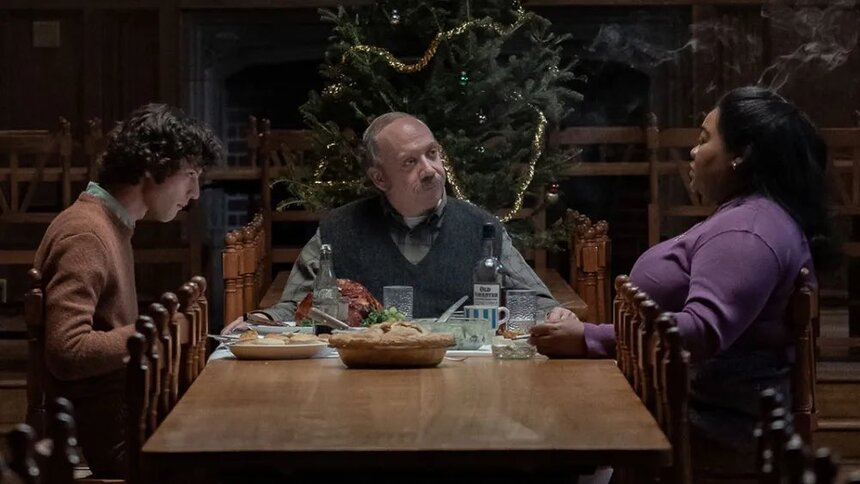THE HOLDOVERS Review: Paul Giamatti Shines in Award-Worthy Comedy-Drama

In Alexander Payne’s (Nebraska, The Descendants, Election) The Holdovers, his first film since the perplexingly underwhelming Downsizing six years ago, the liminal state between semesters at an elite, private educational institution, the fictional Barton Academy in New England, proves incredibly ripe for an enlightening, poignant comedy-drama of errors, misunderstandings, and hard-won life lessons for a trio of outsiders. The Holdovers just might be Payne’s best all-around cinematic endeavor since his first — and until now only — collaboration with Paul Giamatti, Sideways, almost two decades ago.
When we first meet Giamatti’s curmudgeonly character, Paul Hunham, an unpopular senior lecturer in ancient history in the year of our Lord 1970, he’s haranguing the bored, disinterested students under his charge for their laziness, their disengagement with the world, or their intellectual shortcomings. They might be elite in terms of wealth, status, and privilege, but for the widely disliked Hunham, they’re anything but elite. With rare exception, they’re legacy students, placed at Barton because their fathers and grandfathers attended and not because of any intellectual accomplishment or merit.
For Hunham, those exacting standards double as means and method for coping with a rapidly changing, chaotic world. Nixon sits in the White House, the promised withdrawal from Vietnam still years away, and the counter-cultural revolution has begun its long, slow fade into the ennui and cynicism typical of the decade. Self-defense mechanism or not, Hunham’s decision to fail a legacy student the previous semester has placed him in the crosshairs of his superior in office and station, if not intellect, Dr. Hardy Woodrup (Andrew Garman).
As punishment for Hunham’s transgressions, Woodrup all but gleefully assigns him to remain behind at Barton during the winter/Christmas break, supervising the handful of students left behind by parents or guardians for various reasons. Hunham’s best student and not coincidentally, his biggest problem, Angus Tully (Dominic Sessa), initially expects to fly off to St. Kitts with his mother, Judy (Gillian Vigman), and his new stepfather, Stanley Clotfelter (Tate Donovan). Instead, they unceremoniously decide to leave Tully behind, bitter, angry, and even more disillusioned with adults, the adult world, and his place in that world than he was before pre-abandonment.
At first, five students, including Tully, remain behind with Hunham and Mary Lamb (Da'Vine Joy Randolph), the head cook and grieving mother of an American soldier killed in Vietnam. They make for a motley crew, especially as they’re forced to bunk together in the infirmary since the rest of the school won’t be heated during the interim. The not quite incidental arrival of a private helicopter on school grounds leaves only Hunham, Tully, and Mary behind to spend the Christmas holidays together.
As the Holden Caulfield-inspired Tully, Sessa plays off his long-limbed, lanky frame, uncomfortable in his changing, growing body — not to mention the usual hormonal shifts and interests in ever-absent girls — and constantly frustrated with the adult world. He’s not exactly a rebel without a cause, but he qualifies as a rebel without a pause, instinctively rebelling at the myriad rules and regulations Hunham attempts to impose on him, often without fail.
While Hunham enjoys a certain level of privilege as a senior instructor, Mary enjoys next to none. As an African-American woman and the head cook at a mostly all-white prep school, she’s all but invisible to everyone around her, with one key exception: Hunham. Whether out of loneliness or the unstated recognition of their shared cynicism and skepticism towards the powers-that-be at Barton Academy, they share a warm, if still prickly, relationship.
Working from a multi-layered, finely textured screenplay penned by David Hemingson (Whiskey Cavalier), Payne charts the overlapping relationships between Hunham and Tully and Mary with gently unironic, plausibly grounded realism. Starting with conflict (Hunham and Tully) and likeminded, wayward souls (Hunham and Mary) yields emotional and dramatic dividends that always feel both well-earned and well-deserved. When rapprochement and reconciliation follows deeply empathetic experience (Hunham sees himself as a young man in Tully; Tully grudgingly begins to see Hunham as the mentor and guide he desperately needs), it’s both expected and welcomed.
It’s not all heavy emotional drama, of course. Payne and Hemingson layer copious amounts of situational and character-based humor into the proceedings, but as a comedy-drama, humor and heartbreak go hand in hand, often in the same scene.
A brief, heart-shearing moment of hope for Hunham’s long fallow romantic life — by then our hopes are firmly on Hunham’s side — are met with the return of reality where romance remains elusive. For Tully, a chance meeting at a Christmas party with an age-appropriate girl ends almost as quickly as it began, while Mary’s ever-present grief, kept at bay by Herculean effort, bypasses her self-control as one of her late son’s favorite songs plays at the same party.
Ultimately, Payne and Hemingson — aided by a uniformly talented cast elevating each other to new and more expansive heights and Payne’s self-conscious throwback, Hal Ashby-inspired visual and narrative style — deliver one of the better pre-holiday gifts possible: an endlessly engaging film free of pretense and fantasy, filled with simple, if no less essential, life lessons, starting with one worth remembering, accepting others as they truly are and not how we’d like or prefer them to be, judging each other with compassion first, foremost, and also last.
The Holdovers opens Friday, October 27, in limited theatrical release and Friday, November 10, in wide release, via Miramax. Visit the official site for more information.







